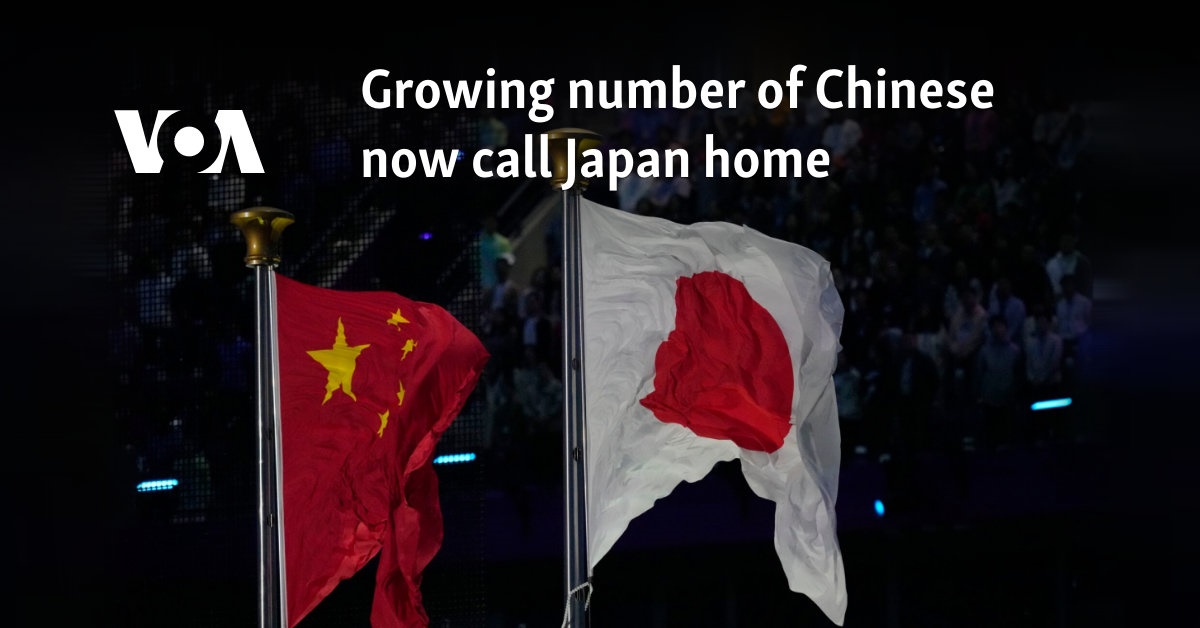Sun Lijun, a 42-year-old semiconductor engineer, says concerns about air and quality of life, raising children and overall economic development in China are some of the reasons he and his wife first discussed moving to Japan nearly a decade ago.
In 2021, they did just that: they left their lives in China behind and moved to Okinawa with their two children.
Moving to Japan on a visa to study business was a first step “to start over and then live a different lifestyle,” he told VOA.
Largest resident pool
Sun is not alone. He is one of hundreds of thousands of Chinese who have emigrated to Japan. They now make up the largest immigrant group there.
According to Japan’s Immigration Agency, 821,838 Chinese nationals were living in Japan at the end of last year, up 13% from 2022. Chinese immigration trends follow a general increase in the number of foreigners moving to Japan, which reached a record high of 3,410,992 people in 2023.
Faced with an ageing population and widespread labor shortages, Japan is implementing immigration reforms to attract more foreigners to the country.
Starting in 2019, the Japanese government pushed to relax the qualifications that previously made it difficult for foreigners to stay in the country. Now, applicants for visas and residency permits for business management can bypass the country’s previously strict standards for special skills, education and residency qualifications.
Chinese demand
The changes in Japan’s immigration policy have had consequences. For Chinese citizens, the new residents have driven up property prices and the development of the real estate market across the country.
Daniel Cheng, president of Wan Guo Jin Liang Company, told VOA that real estate developers in Tokyo often employ Chinese sales teams and that many Chinese real estate companies focus on doing business with Chinese people living in Japan or other places abroad.
Tokyo has attracted many middle-class and wealthy Chinese immigrants, pushing the average price of newly built apartments in the city center up nearly 40% to around $780,000 as of 2022, according to a report by the Tokyo-based Real Estate Economic Institute. That’s significantly more than the average price in the greater capital area, which is about $550,000 for an apartment.
Chin JouSen’s Yuzawa real estate agency focuses on the Chinese market. He said that wealthy Chinese are primarily concerned with preserving the value of their investment when buying property in Japan, while middle-class families are looking for a variety of options that allow them to minimize living costs.
According to Cheng, Japan’s stable political situation, good health and social insurance, and property rights are important incentives for Chinese people. In China, however, individuals are not allowed to own land.
Water Lee, a consultant at InterDots, a company that provides immigration services for people from Hong Kong, told VOA that given changes in the port city’s political environment in recent years, Hong Kongers are also among those moving to Japan.
Integration in Japan
Despite the impact of the influx of new foreign residents, rising housing costs in Japan’s capital and the geopolitical rivalry between Tokyo and Beijing, Chinese migrants say public attitudes in Japan toward immigrants are positive.
Chin JouSen recently started his real estate company in Japan. He said integrating into Japanese society is the most important thing an immigrant can do. And in his experience, the Japanese are friendly and open-minded, Chin said.
Although most Japanese are friendly toward foreigners, Michelle Takahashi, owner of a Tokyo-based aromatherapy company and originally from Taiwan, told VOA that immigrants sometimes sense subtle differences in treatment.
“The Japanese mindset regarding service work can sometimes make foreigners feel like they are being treated special or differently. For foreigners who don’t speak Japanese, this can be challenging,” she said.
The Japanese government provides new immigrants with skilled workers to help them adjust to the new language and culture.
Kazuhiko Isozaki founded the Beru Corporation in 2017. The company invests in unused, empty houses, renovates them and rents them to disadvantaged groups at low prices. He explicitly welcomed the influx of foreign, especially Chinese, capital into Japan.
“The rise in land and property prices is having a positive impact on the economy and foreign capital is helping to push up land prices,” he said.
“Given the ongoing population decline and falling incomes in the country, it makes economic sense to more effectively support the influx of foreign capital and foreign people into Japan.”
He said he hopes to engage in business activities in the future to help foreigners purchase property in Japan, especially through education and support services to reduce the hurdles for foreigners who want to buy a home in Japan.
A slower, happier life
Sun and his family have settled in Okinawa, Japan’s sparsely populated island south of the main island. Sun says he enjoys the climate, slower pace of life and the international vibe he has found there.
Sun ran a coin-operated laundromat for a while before moving into property management. His two daughters are studying Japanese at school.
“After immigrating to Japan, my quality of life and my family’s overall happiness have improved significantly,” Sun said.
VOA’s Katherine Michaelson contributed to this report.


